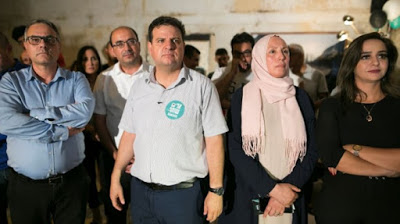Jewish Israelis should cast a solidarity vote for the Arab Joint List
 |
| Gideon Levy 16/09/2019 |
Reminder No. 1: There are such things as solidarity and identification, even if it’s been a long time since we’ve heard anything about them.
Reminder No. 2: Israel’s Arab citizens are a constant target for attack, exclusion and humiliation, especially in this campaign season.
Reminder No. 3: In the end, in the privacy of the voting booth, after all the strategy and tactics are stripped away, voters face their conscience and choose the party nearest their heart. Voting is a very personal act of free expression, of self-determination, emotion, intelligence, morality and identity. This prologue leads of course to an attempt to persuade people to vote for the Joint List on Tuesday.
Very few Israeli Jews can imagine what it means to be an Arab in Israel. To speak Arabic on the bus, to wear a hijab on the train, to face insults from the media and on the street, to try to rent out an apartment in Tel Aviv, to see your brothers trampled under the brutal boot of your state. No Jew in the world lives under such conditions today. Your language is anathema, your identity is erased, your past doesn’t exist, your catastrophe didn’t happen, your existence here is conditional and you’re always suspect; your brother is your enemy and you’re a fifth column.
The current campaign season has brought the incitement to a new nadir. To the right, one-fifth of the population is a vote-getting punching bag — nothing today is more popular, more unifying, than sowing anti-Arab hatred. The political center takes part in the revelry of incitement as well. It too says it won’t join a coalition that includes the Arabs. In Israel, the Kahanists and the neo-Nazis have more political legitimacy than the Arabs do.
The battle is over excluding them from parliamentary life, over delegitimization to the point of making them illegal. A Jewish Knesset isn’t only a Judgment Day nightmare, it’s a vision that’s approaching. Another term or two and we’re there. Even now the Knesset has only 110 lawmakers de facto. No one counts the 10 Arab MKs. The questions asked about them, such as whether they’re permitted to serve on the Foreign Affairs and Defense Committee, would be disallowed in any legislature around the world if they were asked about Jews, for example.
The possibility of joining the government that Joint List Chairman Ayman Odeh raised was roundly dismissed by the main parties. Yisrael Beiteinu Chairman Avigdor Lieberman, the great hope of the left, wasn’t expelled from the Knesset chamber in disgrace when he refused to sit next to a Joint List MK. Imagine what would happen to a European or an American legislator who refused to sit next to a Jew. Israel’s prime minister and public security minister call the elected representatives of the country’s Arab citizens “terror supporters” and “terrorists.”
One can be ashamed by this behavior and not lift a finger, and one can do the only thing that has a chance of ending it, or at least send a signal to Israel’s Arab citizens that they are not alone. The size of the Joint List’s Knesset representation won’t change the country’s fortunes; it will be the third-largest — and the least important. What’s important is that as many Jews as possible vote for it. That will be a genuine protest vote against the right and against racism, a concrete demonstration of solidarity with the oppressed.
Israel’s Arabs deserve and need this. They deserve to know that not everyone is Public Security Minister Gilad Erdan. The Arab doctor in the hospital, the nurse, the pharmacist in the drugstore, the waiter, the construction worker who’s building the country, they all deserve to know that they’re not alone in their country and in their state. To know that Israel will never expel them, as many would like to do. Tens of thousands of Jewish votes for their representatives are the way to send the message. The war against apartheid begins with this small step.
It’s permissible for deep and justified feelings of shame to be a factor in an election. It’s permissible to show solidarity with the weak and set aside all the other considerations — the desire to create a powerful party, a powerful bloc — whose importance can’t be calculated accurately. It’s permissible and necessary to show the Arab cities of Sakhnin and Nazareth, as well as the nearby Jewish cities of Afula and Nof Hagalil (formerly Upper Nazareth) that there is a different Israel, one that won’t continue to remain silent and do nothing.


